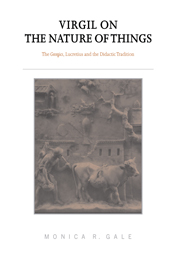Book contents
- Frontmatter
- Contents
- Preface
- List of abbreviations
- 1 Introduction: influence, allusion, intertextuality
- 2 Beginnings and endings
- 3 The gods, the farmer and the natural world
- 4 Virgil's metamorphoses: mythological allusions
- 5 Labor improbus
- 6 The wonders of the natural world
- 7 The cosmic battlefield: warfare and military imagery
- 8 Epilogue: the philosopher and the farmer
- Bibliography
- Index of passages cited
- General index
5 - Labor improbus
Published online by Cambridge University Press: 15 October 2009
- Frontmatter
- Contents
- Preface
- List of abbreviations
- 1 Introduction: influence, allusion, intertextuality
- 2 Beginnings and endings
- 3 The gods, the farmer and the natural world
- 4 Virgil's metamorphoses: mythological allusions
- 5 Labor improbus
- 6 The wonders of the natural world
- 7 The cosmic battlefield: warfare and military imagery
- 8 Epilogue: the philosopher and the farmer
- Bibliography
- Index of passages cited
- General index
Summary
In the proem to the second book of the DRN, the poet pictures himself as looking down, from the well-fortified stronghold of Epicurean truth, on the mass of unenlightened humanity milling around below. With a mixture of scorn and compassion, he decries the vanity of their struggles for wealth and power:
despicere … queas alios passimque videre
errare atque viam palantis quaerere vitae,
certare ingenio, contendere nobilitate,
noctes atque dies niti praestante labore
ad summas emergere opes rerumque potiri.
2.9–13You can look down on others and see them wandering all around, straying in their search for a path through life, as they vie with all their powers, compete for honours and strive night and day with the greatest labour to scale the heights of wealth and power.
The Lucretian picture has much in common with Virgil's condemnation of urban ambition and luxury in 2.495–512, where the corruption of city life is contrasted with the peace and purity enjoyed by the farmer. But whereas in Lucretius' case the word labor is associated with the futile and ruinous ambitions of the city-dweller, Virgil's happy farmer is the one subject to toil (labor (514)). For the Epicurean, labor is incompatible with the peace of mind which is the only valid goal in life (DRN 2.16–19); for the idealized farmer depicted in the finale to Georgics 2, it is an essential component of his way of life.
- Type
- Chapter
- Information
- Virgil on the Nature of ThingsThe Georgics, Lucretius and the Didactic Tradition, pp. 143 - 195Publisher: Cambridge University PressPrint publication year: 2000



